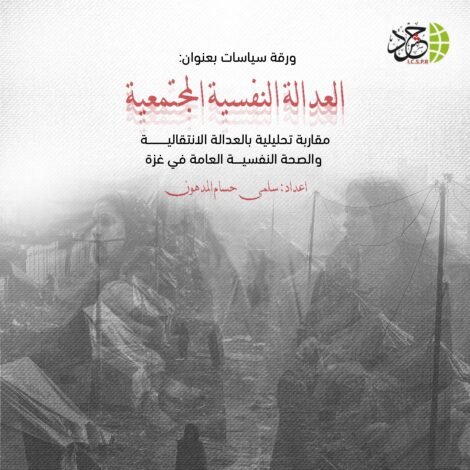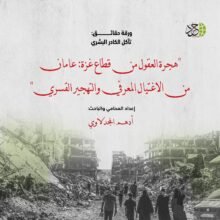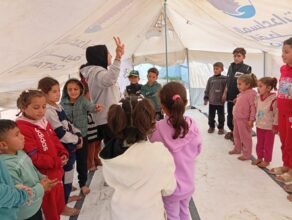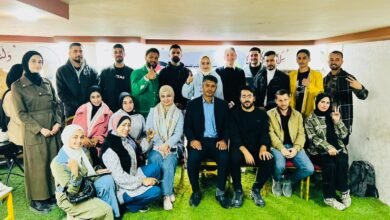
ICSPR issues a new policy paper titled Community Psychological Justice An Analytical Approach to Transitional Justice and Public Mental Health in Gaza,
Date: October 27, 2025
Press Release
ICSPR issues a new policy paper titled: “Community Psychological Justice: An Analytical Approach to Transitional Justice and Public Mental Health in Gaza,” emphasizing the need for a comprehensive national approach to address the psychological and social impacts of aggression
The International Commission to Support Palestinian Rights (ICSPR) has issued a new policy paper titled: “Community Psychological Justice: An Analytical Approach to Transitional Justice and Public Mental Health in Gaza,” prepared by researcher Salma Al-Madhoun. The paper presents an innovative approach to understanding the relationship between transitional justice and psychological justice in the Palestinian context, in light of the ongoing Israeli aggression on the Gaza Strip, which has caused collective trauma and profound social collapse.
This paper comes as part of ICSPR’s ongoing efforts to expand the concept of justice in Palestine—beyond legal and institutional dimensions—to include the psychological and social aspects that deeply affect the Palestinian individual’s daily life and prolonged suffering under occupation and aggression.
The paper seeks to provide a new analytical vision that establishes the concept of “community psychological justice” as a cornerstone of comprehensive justice, linking the recovery of public mental health with achieving social equity and building civil peace after collective trauma.
According to the paper, the recent Israeli aggression on the Gaza Strip has severely damaged the psychological and social fabric of Palestinian society, producing thousands of cases of psychological disorders and deepening feelings of fear, loss, and insecurity, amid the systematic destruction of infrastructure and health facilities. This situation has made psychological justice an urgent humanitarian and national necessity, equally important as legal justice.
The paper further explains that community psychological justice represents a complementary approach to transitional justice, aiming to balance legal accountability for violations with the psychological rehabilitation of victims and society as a whole—through recognizing suffering, documenting crimes, rebuilding trust between citizens and institutions, and reinforcing human dignity and social cohesion.
It highlights that Gaza is currently experiencing one of the most severe mental health crises in its modern history, with an estimated 65% of the population suffering from psychological disorders, including children and women who have lost their families, homes, and livelihoods. Meanwhile, workers in the medical and humanitarian sectors face accumulated trauma due to operating in a constant state of crisis.
The paper observes that current psychological support programs remain limited and short-term in nature, while Gaza’s situation urgently requires comprehensive, long-term national programs for psychological justice—integrating education, justice, health, and media sectors as part of a holistic societal recovery process.
The paper also delves deeply into the concept of community psychological justice as an approach aimed at healing the “invisible wounds” left by violence and aggression, by combining transitional justice mechanisms such as truth-telling, accountability, and reparations with psychological justice components like therapy, empowerment, and the rebuilding of trust and collective identity.
The paper stresses that achieving psychological justice is not solely the responsibility of health institutions but rather a national collective responsibility, requiring the collaboration of legal systems, civil society, media, and educational institutions to establish a new value-based framework capable of overcoming the aftermath of war and reinforcing psychological and social resilience.
In this context, ICSPR recommended the following:
-
Integrating the principles of psychological justice into transitional justice policies and reconstruction plans.
-
Establishing national centers specialized in community-based psychological rehabilitation that work in coordination with legal and social institutions.
-
Launching training and capacity-building programs for local professionals in trauma response and psychological support.
-
Strengthening the role of media and education in promoting the culture of psychological justice and recognition of victims’ suffering.
-
Developing international partnerships to support psychological recovery efforts and rebuild Gaza’s social fabric.
The paper also called for recognizing community psychological justice as a fundamental pillar of transitional justice efforts in Palestine, prioritizing victims’ rehabilitation and social trust-building as essential pathways toward lasting political and humanitarian stability.
ICSPR emphasized that addressing the psychological impact of aggression and occupation must be treated as a national priority, noting that a just society cannot be built without healing the psychological wounds caused by war. It affirmed that psychological justice is the pathway to achieving comprehensive justice and genuine social reconciliation.
In conclusion, ICSPR stressed that this policy paper is part of its continuous efforts to promote justice in all its legal, humanitarian, and psychological dimensions and to highlight the urgent need for a new holistic approach that balances accountability with healing—restoring the Palestinian individual’s sense of dignity and security after years of collective trauma.
Read the full policy paper here:





